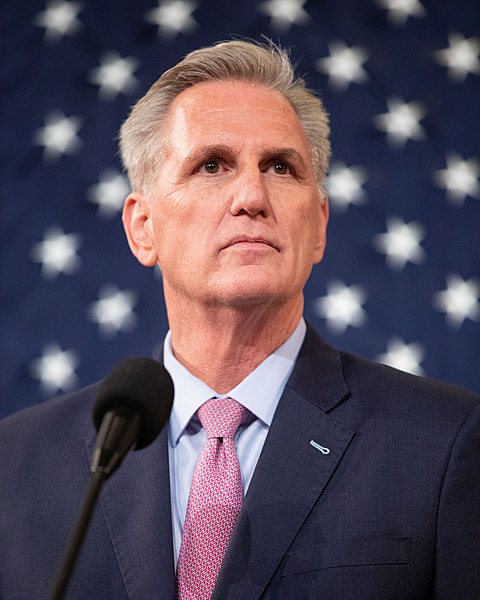
In a historic turn of events, U.S. House Speaker Kevin McCarthy's grip on power has been thrown into uncertainty as the House of Representatives, marred by Republican infighting, conducted
a momentous vote that could lead to his removal from office.
Should the rebellion by right-wing Republicans against McCarthy prove successful, it would mark the first instance in U.S. history where House lawmakers voted to depose their leader, with no clear successor in sight.
McCarthy's fate hung in the balance after the House initially rejected, by a vote of 218-208, a motion seeking to block the leadership challenge mounted against him by Representative Matt Gaetz, a far-right Republican from Florida.
Eleven Republicans joined forces with their Democratic counterparts, permitting the challenge to proceed. "We'll see what happens," remarked McCarthy, 58, to reporters before the vote.
The voting process unfolded at a deliberate pace, with lawmakers individually called by name. The chamber, otherwise quiet, resonated with "Yeas" and "Nays."
The speakership challenge marked another instance of high-stakes drama in a year that witnessed the Republican-controlled House teetering on the brink of default and a potential government shutdown.
With a narrow majority of 221-212, McCarthy's party controls the chamber, meaning that just five Republican defections, alongside united Democratic opposition, could jeopardize his grip on power.
During the House floor debate, Gaetz and a small group of allies criticized McCarthy for relying on Democratic votes to secure temporary funding, averting a partial government shutdown. They also accused him of failing to vigorously pursue spending cuts.
"We need a speaker who will fight for something - anything - other than staying on as speaker," asserted Republican Representative Bob Good.
In defense of McCarthy, some of the chamber's most vocal conservatives argued that he had effectively curbed spending and advanced other conservative priorities, even amidst Democratic control of the White House and Senate. They cautioned that these accomplishments would be at risk if McCarthy were removed from leadership.
"Think long and hard before you plunge us into chaos because that's where we're headed," cautioned Republican Representative Tom Cole.
Democrats, on the other hand, remained uninterested in helping Republicans resolve their internal issues. They generally perceive McCarthy as untrustworthy due to his breach of a spending agreement with Democratic President Joe Biden and his endorsement of an impeachment investigation into the president, which has angered them.
"Let them wallow in their pigsty of incompetence," stated Representative Pramila Jayapal, who leads a group of progressive Democratic lawmakers.
Matt Gaetz was among the Republicans who repeatedly opposed McCarthy's bid for speaker in January. McCarthy eventually secured the gavel after 15 rounds of voting.
Some Republicans argue that the focus should be on legislating rather than internal strife.
"This country does not need more drama," argued Republican Representative Steve Womack.
Supporters of McCarthy contend that Gaetz's motivations stem from a desire for publicity, an opportunity to secure higher office, or resentment over an ongoing ethics investigation into potential sexual misconduct and illicit drug use. Representative Garret Graves pointed out that Gaetz has been using his attempt to remove McCarthy as a fundraising tool, which he found "disgusting."
Gaetz, however, has denied any wrongdoing and asserted that his actions are not driven by personal animosity towards McCarthy. "This isn't a critique of the individual—it's a critique of the job. The job hasn't been done," he stated. Photo by United States Congress, Wikimedia commons.






































